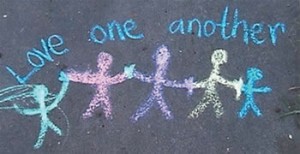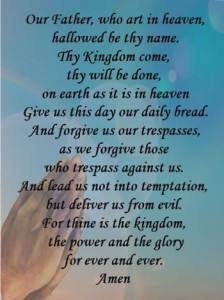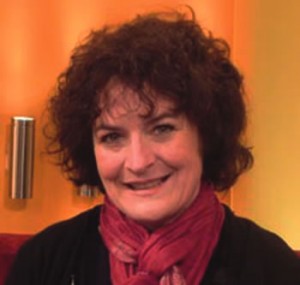What my Faith means to me
To speak at Mass is a privilege and a slightly unsettling challenge, because articulating the elements of a Faith has been something I’ve tended to shy away from.
The very word Faith suggests confidence, conviction, steady belief. I really don’t feel I can claim that - indeed I’m more familiar with the Doubting Thomas of today’s gospel than with steady conviction. Hope – as suggested in the other readings - comes more readily to me, is a more natural part of my relationship with Catholicism. So perhaps I can say – if a little paradoxically – that what my Faith means to me, first up, is hope. Hope in God, hope in Jesus, in a community of the Faithful – which I’m very grateful to be part of - hope in the implementation of the Gospels’ message, and ultimately in all the multiple meanings offered by the Resurrection.
We were taught, when young, that Faith was a gift. The truth of that has become clearer to me over time. I’ve observed that a yearning for the transcendent, for the numinous, for something beyond the material life, is not automatic for all people. Many of my friends - many of my extended family - insist on and are reassured by a wholly rational, scientific assessment of life and meaning; for myself, a sense of something beyond the measurable, a sense of something other, has always seemed more likely, and certainly more nourishing. I’m interested in things spiritual and all religions, for that reason, because at the heart of those explorations is an attempt to explain, to give meaning to existence, and to try and capture the nature of something over and above the concrete world we inhabit.
My hopeful Faith suggests to me: We are here for a reason. A reason beyond human appetites and survival instincts.
To honour God and to love one another, as he has loved us, is an immensely appealing and persuasive reason for being.
It buttresses my daily life, my relationships, my political views, my writing life, my sense of purpose.
Occasionally I debate with my sisters – when we’re struggling with matters of doctrine or unedifying aspects of the institutional Church – the virtues of other Christian faiths - say Anglicanism, Presbyterianism, Congregationalism (an enduring favourite because of its essentially democratic processes). These are all admirable faith communities – and I have attended and been fascinated by, say, Lutheran services in Germany and Anglican liturgies in the UK. Nevertheless, I find myself more and more clear that my Faith is a Catholic one, and, for better or worse, I prefer to practise within its traditions, mindful of its weaknesses as much as its strengths. 
I was born into Catholicism and I am glad for that. I’m grateful – now - for the Tradition I’ve inherited. I come from a long line of devout Irish and Italian Catholics, and I’ve become increasingly aware of the beauty and fidelity of their practice. They contributed to the building of churches and schools; they taught the Faith to their children, they gave daughters and sons to the Faith; with faith – and presumably in time of doubt, too – they attended Mass and the sacraments. I like to think of my parents, grandparents and all going before as pilgrims who stayed steadfast and worked on a legacy that I’m only now properly beginning to understand. I couldn’t easily set that legacy, that Tradition, aside. Rather, I want to understand it better and be connected to its past and future.
 But, I am a child of post-Vatican II Catholicism and as such it is the message of the Gospels and the life of Jesus that shines most clearly for me in our Faith. ‘See how they love one another’ was the surprised - even shocked - response to the early Christians as they spread their new message. I find that such a moving moment in Christian history…the power of that message lay in it being lived by the first followers of Jesus. And what a compelling message, what a code to live by, if ever there was one. That message was at the heart of the religious education I received in primary and secondary schools: ‘A new command I give you: Love one another. As I have loved you, so you must love one another..’
But, I am a child of post-Vatican II Catholicism and as such it is the message of the Gospels and the life of Jesus that shines most clearly for me in our Faith. ‘See how they love one another’ was the surprised - even shocked - response to the early Christians as they spread their new message. I find that such a moving moment in Christian history…the power of that message lay in it being lived by the first followers of Jesus. And what a compelling message, what a code to live by, if ever there was one. That message was at the heart of the religious education I received in primary and secondary schools: ‘A new command I give you: Love one another. As I have loved you, so you must love one another..’
So, in a very real sense my Faith means trying always to have that message at the front of my daily life. Love one another…At its most simple, this translates for me into trying to be open and less judgmental, trying to see goodness where possible, trying to be less self-involved…trying to forgive.
I think that, of all the basic tenets of Christianity, forgiveness is the most beautiful, the most difficult, and the most thrilling.
Love one another provides means by which to assess all decisions, all political alignments, work, relationships…it is a kind of wand and armour with which to move through a complicated world, a complicated life.
As a 21st century Catholic, and an heir to Vatican II’s seismic processes, I believe also that my hopeful Faith requires me to be an argumentative Catholic. A questioning Catholic, not a supine and inert one – but one who listens, reads, thinks, and, when appropriate, challenges one’s Church. Many of my peers grew exhausted or disappointed with the Church and left, and certainly I’ve had my disaffected, faithless times, but I’ve come to think that – as with a family – one doesn’t leave when difficulties arise… One stays on and actively debates and agitates. One accepts the challenge of belonging to a human – and therefore imperfect - community.
But debate and agitation and challenge require deeper knowledge and understanding – something it’s taken me years to appreciate. Now, finally, I am reading about comparative religions, I’m reading religious history, theology, the gospels…. My sisters gave me an annotated Bible for my birthday last year and I am very slowly making my way through the Old Testament. Suddenly, whole parts of the liturgy make more sense. The sometimes disparate elements of my Faith are slowly being knitted together.
Which brings me to a final element: reading The History of God by Karen Armstrong I was struck by her description of religious faith being something that is practised. Literally. A faith must be practised with dedication and patience in order for meaning and revelation to be provided. Call me a slow learner, but only now is the regular participation in the sacraments revealing its full purpose to me. The sensory, physical reiteration of ritual and liturgy – when two or more are gathered in his name - I now understand, deepens faith – moves it ultimately perhaps from the hopeful to the certain.
 But that’s a life’s work. Maybe, the truly final element of my faith is that it is a continual exploration, a perpetual moving forward into new, mysterious territory, a hopeful leap into semi-darkness, a living with uncertainty, doubt, sometimes fury, and sometimes a consoling peace. It has something in common with the act of writing, I think: You don’t know really what you’re writing when you start out…there are glimpses of things, moments of clarity, but the light shines only occasionally. There are long fallow periods, chasms of doubt. Importantly, one must go forward with hope, questioning, practicing, pausing, dying to self. In the same way as I keep – figuratively speaking – picking up my pen, so, I hope too, to keep saying…Our Father who art in heaven, hallowed be Thy name.
But that’s a life’s work. Maybe, the truly final element of my faith is that it is a continual exploration, a perpetual moving forward into new, mysterious territory, a hopeful leap into semi-darkness, a living with uncertainty, doubt, sometimes fury, and sometimes a consoling peace. It has something in common with the act of writing, I think: You don’t know really what you’re writing when you start out…there are glimpses of things, moments of clarity, but the light shines only occasionally. There are long fallow periods, chasms of doubt. Importantly, one must go forward with hope, questioning, practicing, pausing, dying to self. In the same way as I keep – figuratively speaking – picking up my pen, so, I hope too, to keep saying…Our Father who art in heaven, hallowed be Thy name.
Kate De Goldi is an award-winning writer. She is a member of St Mary of the Angels parish in Wellington, NZ.

 Entries(RSS)
Entries(RSS)